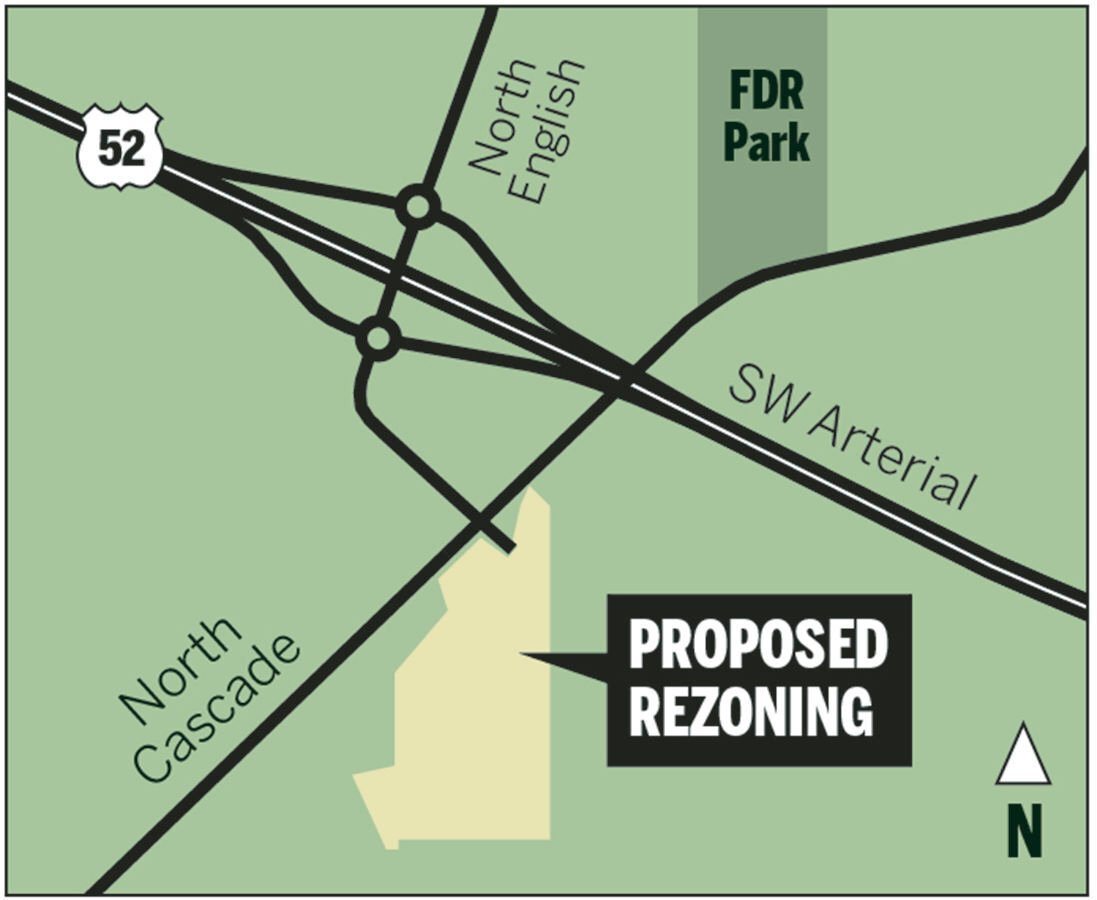The developers behind a proposed, 15-lot commercial project just south of Dubuque provided too little information to convince Dubuque County Zoning Commission members this week to rezone the 75-acre property.
The property is located at the intersection of North English Road and Walser Lane, just southeast of North Cascade Road and the exit from the Southwest Arterial. Developers seek to rezone it from rural residential to highway business.
One of the developers, Chris Miller, told the commission that he has found significant demand for the project, which would be the first of its kind since the completion of the Southwest Arterial.
“We’re working with a couple of potential tenants who would buy two of the 15 lots,” Miller said. “They are having trouble finding land. Their other options are Illinois and Wisconsin, and they are actively pursuing that. This would provide them what they need here.”
He said the companies interested in the lots would be “light retail” and other “commercial business.”
“They might have outside storage, might have offices there for the employees,” he said. “It wouldn’t be a high-traffic area, based on what I know. There is probably going to be some semi(-tractor trailer) deliveries. But I would think most of that would be crossing the two-lane road (North Cascade Road), not traveling on it.”
The property historically has been used for agricultural, but it always has been zoned rural residential, according to County Zoning Administrator Tammy Henry.
“When they came in and did zoning, someone in the late ’60s, early ’70s said, ‘This is what this use will be some day,’” she said. “I cannot tell you. I don’t have reference for why people then zoned things the way they did.”
But the land would have to be rezoned for the commercial project to proceed. Miller understands the board’s hesitancy.
“I know it’s kind of a hot button when you’re rezoning ag-use land,” he said. “But the Southwest Arterial came in, (and) I think eyes were open that the use was eventually going to change out there, whether it’s now or down the road. It’s inevitable.”
Henry acknowledged that Walser Lane is effectively a frontage road connecting to properties in the area. Zoning commission members voiced some general agreement with commercial use being inevitable and expected.
“If we can control and foster a good location for businesses to come in, so we don’t end up with another Northwest Arterial and stoplights everywhere, so we’re taking them (businesses) back onto these side or frontage roads, that is ideal,” said Commission Member Samantha Boyes. “We’ll have to take that into consideration as businesses continue to encroach on this area.”
Commission Member Ron Breitbach also said the side roads seemed to be designed to accommodate commercial use. But he said Miller had not provided enough information for him to be comfortable supporting the rezoning request this week, especially since the land has been used for agriculture.
“I understand as a developer of this, you’re probably not at liberty to share a lot of that,” he said. “My concern is the lack of information.”
Miller then shared that he actually co-owned one of the businesses, the lumberyard Tri State Building Supply, but he said he could not provide confidential information on the other.
Breitbach made a motion to table the rezoning request until more information was provided, and commissioners voted unanimously to do so. That was a relief to Catherine Caitlin, a member of the public who spoke against the rezoning during the public hearing.
“I’m concerned that the zoning board would approve this without specifics, with them being cagey about who is going to use some of those lots,” she said. “What about the water impacts, the wastewater and traffic?”
Cynthia Welsh and her husband have lived next to the property for 25 years and spoke against the proposal.
“Our house faces the property that they’re talking about,” she said. “Who wants to have retail establishments in their front yard? It would be different if it was single-family residential. It’s really upsetting to me that it’s ruining my life that we worked so hard for.”
Welsh said the land has not been used recently for agriculture but was planted with prairie plants through the Conservation Reserve Program of the U.S. Farm Service Agency, which aims to improve environmental health and water quality.


